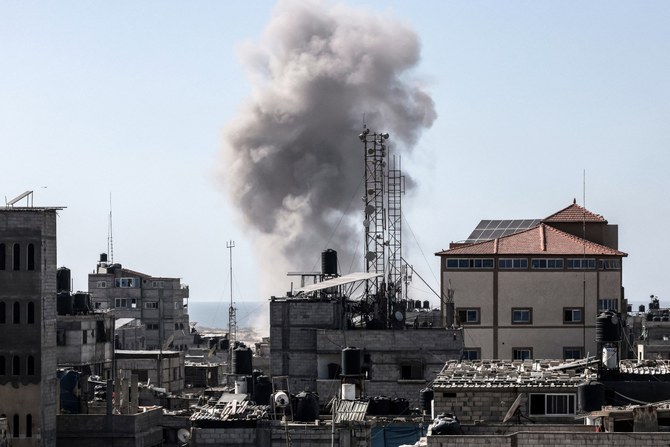Dr. Mohammed Al-Sulami
Iran’s recent military strike on Israel sparked much debate over its implications. While some argue that Iran achieved symbolic victories and potentially reshaped its relations with Israel and the US, others suggest that the primary focus should be on the impact of the attack on the Palestinian cause, particularly during this critical juncture. However, beyond the controversy, it appears that the missile and drone strikes had little utility and actually harmed the Palestinian plight.
The strikes, planned by Tehran, aimed to secure symbolic gains without provoking significant responses from Israel or the US. But the Palestinians were not factored into Iran’s strategic calculations. Consequently, the attack failed to serve the Palestinian cause. Furthermore, Israeli Prime Minister Benjamin Netanyahu capitalized on the strikes to divert international attention away from the Palestinian issue. By leveraging the situation, he sought to evade pressure to cease the war in Gaza and to reposition himself both domestically and internationally.
The aftermath of the strikes has significantly complicated the situation for Palestinians. Prior to the Iranian attack, the Palestinian issue was firmly in the spotlight among international and regional powers. Netanyahu and his government were also under mounting internal pressure due to the security failures leading up to Oct. 7. Subsequently, they faced isolation and increasing American and Western pressure. This pressure escalated to the point where there were calls to replace Netanyahu and his hard-line allies with leaders who would be more inclined toward constructive approaches to political settlements and resolving the long-standing conflict between Israel and the Palestinians.
In addition, there was a regional insistence on Israel ending its military campaign in the Gaza Strip. And there were urgent appeals to alleviate the humanitarian crisis and provide essential aid to civilians. Most crucially, there was a concerted effort to pursue a fair resolution to the enduring Palestinian issue. Israel’s global image had suffered a severe blow, reaching its lowest ebb, while the legitimate rights of Palestinians garnered unprecedented support. The plight of Gaza had elicited widespread sympathy on an international scale.
The Iranian attack on Israel dramatically altered the dynamics surrounding the Palestinian conflict, granting Netanyahu his desired outcome. Israel, previously isolated both regionally and internationally, found itself at the center of a coalition rallying to defend its territory. Formerly marginalized Israeli leaders began receiving support from world leaders, transforming Israel’s international standing from accused to defender.
Israel wasted no time in leveraging the strikes to refurbish its image, portraying itself as a victim facing an existential threat in a hostile environment – a narrative it has cultivated for decades. The discord between Washington and Tel Aviv gave way to a profound understanding, which Netanyahu capitalized on to navigate the internal pressures that preceded the attack. With the successful repulsion of the Iranian strikes, Netanyahu gained the legitimacy to bolster his authority, empowering him to pursue hard-line policies toward the Palestinians and disregard international calls for negotiations to resolve the conflict.
The recent attack could have held significance for the Palestinians and their cause had Iran integrated it into its rhetoric of supporting and defending Palestine, especially at this critical juncture for the Palestinian issue. However, the strikes were executed without consideration for the challenges facing the Palestinian cause or the dire situation in Gaza. They also disregarded the presence of Iran’s allies in Gaza, which are actively engaged in the Palestinian resistance and are being targeted by Israel.
From Iran’s perspective, the strikes represented a victory, providing protection for its leaders in the face of Israeli aggression and restoring a sense of dignity. Additionally, they served to maintain Iran’s reputation and domestic credibility amid the ongoing conflict.
Iran’s recent actions not only deviated from its vocal support for Palestine, but also had a detrimental effect on the Palestinian cause, diverting global attention away from it at a crucial moment. This diversion hindered international efforts aimed at halting the ongoing conflict, alleviating the humanitarian crisis in Gaza and pressuring Israel to cease its military operations against civilians.
Instead of bolstering support for Palestinians, Iran’s attack provided Netanyahu and hard-line elements within his government the justification to disregard both internal and external pressures. This emboldened them to intensify military operations in Gaza, as evidenced by the subsequent developments on the ground. Additionally, it allowed them to consider implementing previously postponed aggressive plans, such as storming Rafah, potentially escalating the conflict further.
And by diverting international attention, Iran inadvertently facilitated Israel’s ability to prolong the conflict, allowing it to exploit the distraction to advance its military objectives while the world’s focus was elsewhere. This has prolonged the suffering of civilians and exacerbated the humanitarian crisis, which has been raging incessantly for more than six months.
In addition, while the international community is preoccupied with the Iranian strikes on Israel and Friday’s apparent Israeli counterattack, on the Ukrainian front, it has been reported that Russian troops have made advances at the expense of Ukrainian forces, which are suffering from arms depletion against the backdrop of the US Congress’ sluggishness in approving a new round of funding.
The danger lies in Israel’s potential exploitation of the opportunity provided by Iran, which could lead to the imposition of a new reality regarding the Palestinian issue. Netanyahu may seize upon the Iranian strikes to evade pressure and demands concerning the Palestinian problem, while the US might leverage them to advance its wider regional agenda. However, it is imperative that the international community and regional nations resist falling into this trap. They must not be swayed by the extremist policies of Iran and Israel, which could exploit regional escalation and polarization within competing security frameworks, potentially sparking a new cold war in the Middle East. Such actions could serve as a diversion from domestic political, economic and security failures.
The Palestinian cause should not be held hostage to the ambitions of Iran and Israel, nor should it be manipulated to strengthen their respective positions. It is crucial to restore regional and international momentum toward ending the conflict and achieving a just and comprehensive settlement for Palestine. Urgent efforts are needed to pressure Israel and its government to curb their extremist policies. A resolution to this issue is not only essential for the stability and security of the region, but also for fostering broader integration and cooperation initiatives.







